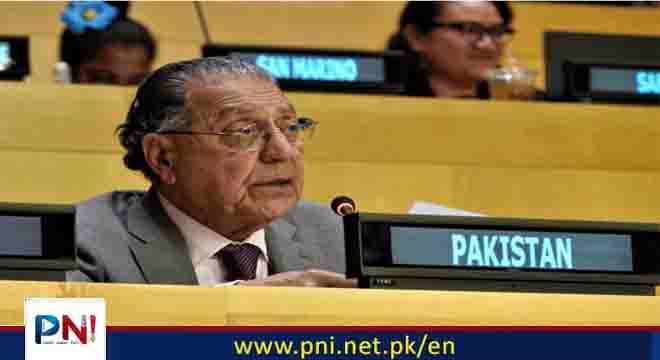UNITED NATIONS, Oct 05 : Amid multiple challenges facing developing countries, such as armed conflict, climate change, poverty and food insecurity, Pakistan has called for stronger international cooperation to advance social development, bridge the digital divide and alleviate poverty.
“Inclusive social development is at the core of the several actions outlined in the Pact of the Future,” Ambassador Munir Akram told the UN General Assembly’s Third Committee, which deals with social, humanitarian and cultural matters.
He was referring to the Pact, which the world leaders adopted at UN headquarters in New York on Sept 22 at the Summit of the Future that includes a Global Digital Compact and a Declaration on Future Generations.
“Realizing the Pact’s objectives of poverty eradication, social protection, education and health for all, empowerment of women and youth, sustainable development, and climate resilience, will require political will, global solidarity and adequate financing,” the Pakistani envoy said.
“The world is witnessing a historic demographic transformation,” Ambassador Akram said. He added that the number of persons over 60 is projected to rise from 1.2 billion in 2024 to 2.1 billion by 2050.
“This will require adjustment to every aspect of our society, economy and public policy,” he said, underscoring the need to prioritize social protection systems, promote decent jobs as well as access to healthcare and pensions.
“While the number of elders expands mostly in developed countries, he said, the youth bulge grows in mostly developing countries, noting that Declarations on Future Generations reinforces the policy required to respond to these developments, the changing nature of work, legal and illegal migration and the impact of technology.
Referring to the upcoming thirtieth anniversary of the International Year of the Family, the Pakistani envoy urged the international community to reaffirm its commitment to supporting families as agents of sustainable development.
“Our religion, Islam, promotes family well-being, intergenerational solidarity, and social protection for all,” he added.
About the need for improving social policies, particularly in areas such as social protection, healthcare, and education, Ambassador Akram also said it was critical to bridge the divide to ensure an equitable, inclusive and universally beneficial digital transformation.
“The commitments made in the Global Digital Compact must be fully implemented,” the Pakistani envoy stressed.
The Pact, he said, had agreed on several actions to bridge the SDG (Sustainable Development Goals) Financing Gap to boost progress on making the world a better place to live in.
These include the commitment to re-channel 50% of the unused 2021 allocation of SDRs (Special Drawing Rights); to explore ways for speedy issuance and rechanneling of SDRs in response to future shocks; to consider capital increases for MDBs (Multilateral Development Banks); to support negotiations on a UN Framework Convention on International Tax Cooperation; and to deliver a robust IDA (International Development Association) replenishment and establish a pathway for larger IDA funding by 2030.
Ambassador Akram urged the UN Secretary-General to focus, in his next report on social development, on the fulfillment of the commitments made in the Pact of the Future.
Follow the PNI Facebook page for the latest news and updates.









